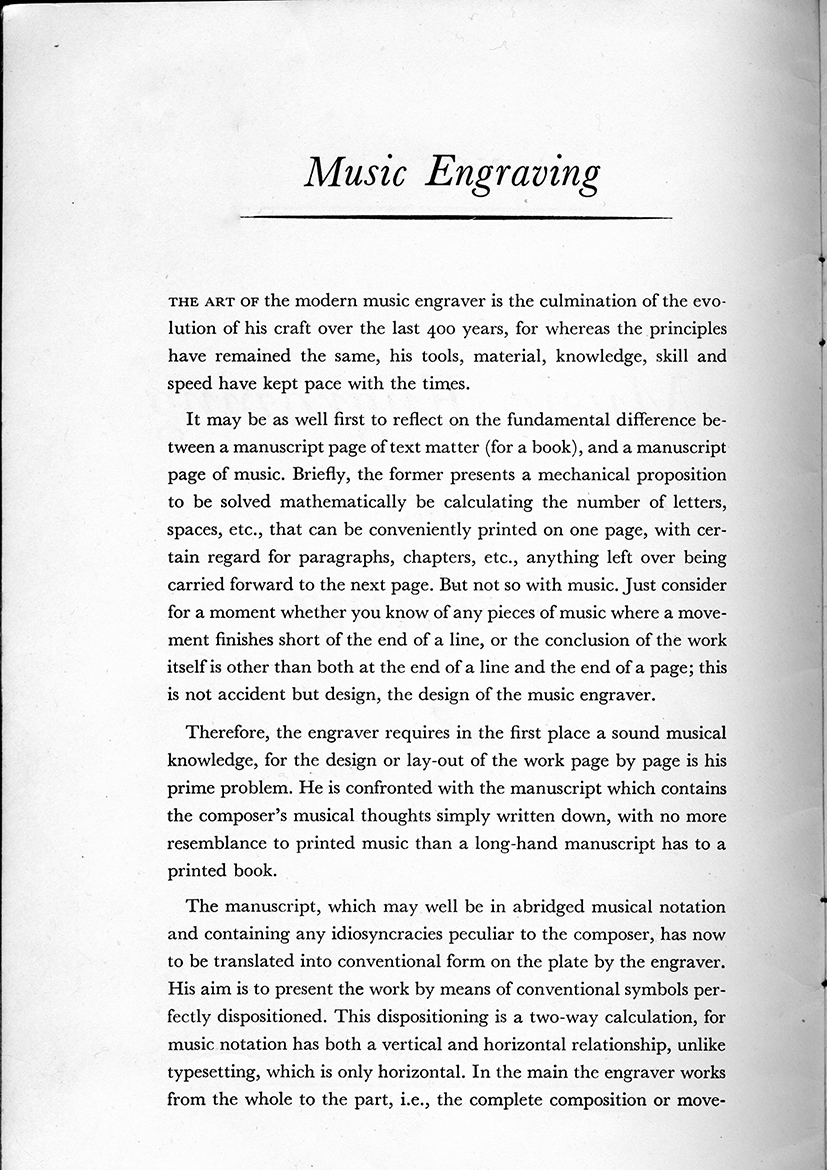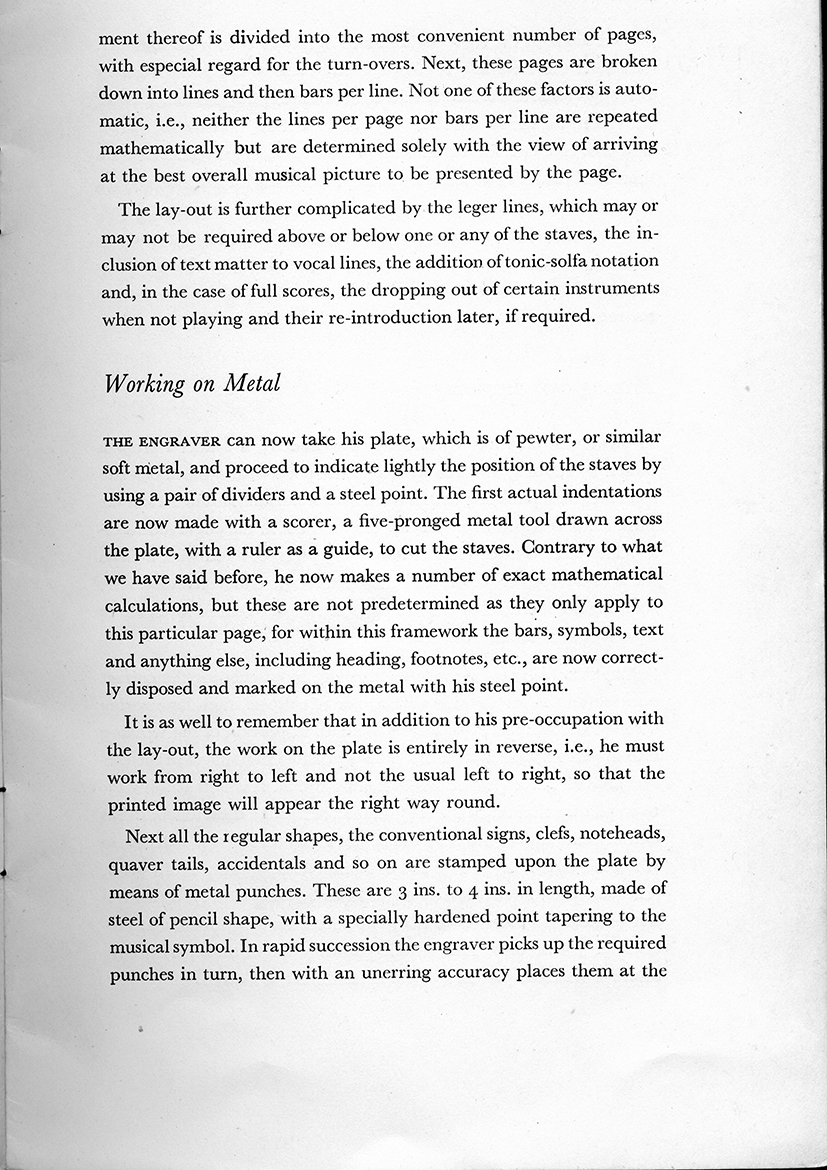Page 1 of 1
A Note on Music Engraving
Posted: 05 May 2017, 13:11
by benwiggy
I thought you all might like to read the following extract from "A Note on Music Engraving and Printing" by Norman Gray, published by Boosey & Hawkes in 1952.

- Engraving003.png (530.94 KiB) Viewed 10651 times

- Engraving004.png (543.18 KiB) Viewed 10651 times
Re: A Note on Music Engraving
Posted: 05 May 2017, 19:40
by OCTO
...wonderful.
Re: A Note on Music Engraving
Posted: 05 May 2017, 19:49
by tisimst
That's just lovely. Thanks for sharing, benwiggy!
Re: A Note on Music Engraving
Posted: 05 May 2017, 19:55
by David Ward
It is indeed rather wonderful.
However, one thing has long bothered me. Is there any rational reason other than tradition (OK, not to be undervalued) for the usual insistence that a piece should always end at the bottom of a page? I would draw the line at ending short of the right margin, but whatever is wrong with ending (say) half way down a page? I am unable to grasp any logic or useful point in this ‘engraving rule’ other than die-hard stick-in-the-mud-ishness.
Re: A Note on Music Engraving
Posted: 05 May 2017, 20:04
by benwiggy
I think it stems from sheet engraving practice, where as Gray says, you work from the top down. So you start with the print area of your plate, and you start casting off to fill it. Computers can easily do all the maths to work upwards, which gives you one system and two fat measures on a page.
(Interestingly, one of the frequent questions on the Dorico forum is "How do I make it fill the last system". (The default is to cut it short if it stretches too much.)
Re: A Note on Music Engraving
Posted: 06 May 2017, 11:51
by Knut
David Ward wrote: ↑05 May 2017, 19:55
It is indeed rather wonderful.
However, one thing has long bothered me. Is there any rational reason other than tradition (OK, not to be undervalued) for the usual insistence that a piece should always end at the bottom of a page? I would draw the line at ending short of the right margin, but whatever is wrong with ending (say) half way down a page? I am unable to grasp any logic or useful point in this ‘engraving rule’ other than die-hard stick-in-the-mud-ishness.
I'd say both yes and no.
To me this seems to have everything to do with aesthetics, so there is a reason for it other than tradition. Then again, many such aesthetical aspects are established because of tradition, so it wouldn't be wrong to say that tradition is what it comes down to.
Another thing to remember is that facing pages are naturally regarded as much more of a single unit in music than in print, and so, when all page breaks are accounted for, it's only natural to try to fill those facing pages as evenly as possible. To a certain degree the same principle is used in print as well; rarely, if ever, does one see a page with only a few words or a single line printed on it.
Print, however, is much more susceptible to an uneven visual balance due to variations in vertical or horizontal spacing of text, so there is a limit to how much you can do to prevent extensive white space. Whereas in music, it's usually relatively easy to fill one or more pages by distributing the measures and the negative space evenly across pages.
Re: A Note on Music Engraving
Posted: 06 May 2017, 14:02
by John Ruggero
David Ward wrote: ↑05 May 2017, 19:55
whatever is wrong with ending (say) half way down a page?
It has always been a matter of economics for publishers to place as much music on each page as possible and thus reduce the number of pages and increase profit. And it is more pleasing visually if the music be evenly placed on the page and not bunched up at the top. So if a piece or page has only a few measures, those measures should be evenly placed on the page. If two facing pages are involved, Knut's explanation comes into effect: we are repelled by the illogic of unequal distribution of the music between the two pages.
There is also the matter of page turns, which should drive the layout of music with few staves per system. One should avoid a page turn at the end which results in just a few measures following since those measures could have been placed on the previous page and the page turn avoided. If there is too much music to be placed on one page after the final page turn, there is every reason to distribute it evenly over the final two pages, according to Knut's Law.
Re: A Note on Music Engraving
Posted: 06 May 2017, 18:43
by benwiggy
John Ruggero wrote: ↑06 May 2017, 14:02It has always been a matter of economics for publishers to place as much music on each page as possible and thus reduce the number of pages and increase profit.
And not only to reduce the number of pages, but to make that number divisible by 4. Nothing worse than laying out music on 5 pages with 3 blanks to follow!
I'm reminded of the legendary book publisher I used to work for, whose critique of a design with over-generous margins amounted to: "We're not here to sell fxxxxx paper!"
Re: A Note on Music Engraving
Posted: 07 May 2017, 16:47
by John Ruggero
How right you are, benwiggy. Very funny story! Unfortunately the quest for the magic number 4 often ruins layout and rules out the best page turns. Of course, publishers don't let blanks go entirely to waste and fill them with ads for other music which often makes interesting reading in old editions for the historically-minded. Fall-apart (misnamed "perfect") binding has made the quest a little less sought-after now at least in piano music.